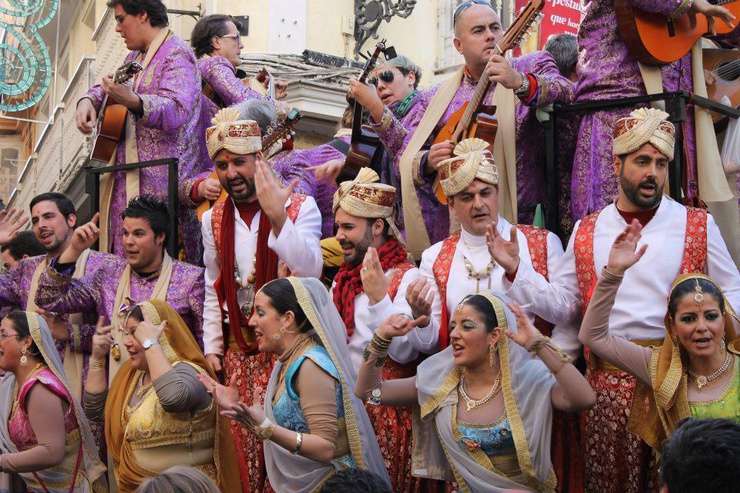
Erasmus students do carnival and chirigotas in Cadiz - crisis, what crisis?
Published on
Translation by:
Tom GaleDespite drastic austerity measures across Spain, the Cadiz Carnival between 16 and 26 February kept all its pomp. A young Frenchman at the heart of the festivities discovers whether the satirical event is a way of channelling the people’s fury or a real show of community in the face of the financial crisis crippling the country
Against an electric political and economic backdrop, a young, naive European like myself would usually expect a tense atmosphere during festivities in Spain, but that would be to misjudge the Andalusians: carnival has kept all its pomp. In fact, it might even be times such as this that the carnival comes into its own. Since the days of ancient Rome, carnivals in the tradition of panem et circenses ('bread and games'), have been used as a way to channel the anger in the streets and distract the people’s attention from current socio-economic problems. The tradition was reinforced in the Middle Ages where the peasants obtained the right to live a day in the life of a nobleman and sit at their table.
Generation erasmus goes to Cadiz
The carnival tradition in Cadiz, situated on the southern tip of Spain, has been around for centuries and has been passed down from generation to generation. Gaditanos - the inhabitants of Cadiz - of all ages take to the streets in fancy dress. Over the last few years, the festivities have also attracted an entirely different population: young Europeans on erasmus or student exchange placements in the region. One member of this new generation is Emeline, a 20 year-old student from the Sorbonne university in Paris who is 'on erasmus' in Cadiz and takes the time to take us on a tour of the city.

Emeline shares her apartment with two English students, but for the last ten days her cosy nest has become a real-life Auberge Espagnole: English, Belgians, French and Americans all take turns spending the night in the spare beds. As soon as we step foot off the train, there is no time to lose. Without hesitation we slip into our costumes and head towards the central plaza. The English, French and German students quickly slip into Spanish conversation and everyone dances to the sound of classic rock songs with a Spanish twist. The booze flows freely and the air is saturated by the smell of cannabis.
Party prevails
Far from the general austerity in Europe and from the deep cuts and ministerial accords, the erasmus generation are enjoying themselves, while political demands resemble the absent consumers. After all, we are here to have fun, so what are we waiting for?! However, the young Europeans are not about to forget the grounds for protest. In Spain, a number of students were charged by the police during a peaceful protest in Valencia. In Greece, the government has approved a new set of budget cuts, ignoring the desperate appeals from its citizens. In France, the future does not seem any brighter with rising unemployment and students finding themselves in more and more precarious circumstances. The balance sheet might not be in good shape, but for now that doesn’t matter: the singer belts out a flamenco version of The Beatles classic Let It Be, summing up the spirit of the carnival to a tee. Carpe diem.
'After six months in Cadiz, I still don’t know the name of the mayor nor his political orientation'
'Here, we are largely cut off from the world, from politics; all of that seems a long way away from us,' explains Emeline. 'After six months in Cadiz, I still don’t know the name of the mayor nor his political orientation.' The carnival is an old tradition, and this crisis is not about to lower the morale of the Gaditanos. 'They really do have an appetite for partying to keep their spirits up.' Were the Romans right? Are bread and games enough to keep the people calm and continue the cuts? Not exactly; it would be ill advised to confuse depoliticisation with apathy. 'With the financial crisis, many shops have closed, notably a squat that was offering free medical supplies,' says Emeline.
Fallen prime ministers and sports stars 'present'
Faced with economic stagnation, the Andalusians are doing things their way. In the labyrinthine streets of Cadiz, small groups form at each crossing, chanting in Spanish. Under their nun, school girl and other ridiculous costumes they mock the elites and power, however their message is serious: they are a chorus, or coros. They use their voices to chant ironically about their social and economic plights that they are living through on a daily basis. Others take the satire one step further: we come across someone dressed as the cyclist great Alberto Contador sporting a French jersey and even a miniature Silvio Berlusconi, followed closely behind by an 'Anonymous', representing the protesting citizen of the times.

After a relatively well lubricated night of festivities and a relatively short night’s sleep, the carnival approaches its end and it’s already time to leave. Early in the morning, I come across Tarzan dragging his club along the ground. On the other side of the road, a café is already open, and it’s time to head back to work. For the erasmus students, it’s also time to go back to university and Emeline is worried. 'I have to write three essays for the first day back and I haven’t even started!' Is she aware of being part of this erasmus generation, which is certainly depoliticised, but not apathetic. They think of a more connected Europe whose borders are relative. It goes beyond this week-long binge that was the Cadiz carnival, played out rather than enjoyed. As the great thinker Umberto Eco recently declared: 'It’s culture, not war, that cements European identity'. He’s right on more than one account. We did not see British euroscepticism, German rigour or French pretention throughout the week - just a common will. Despite austerity across Europe, Cadiz has given us a reason to continue to promote a sense of togetherness and the overhaul of European identity. Should we believe in it? I for one hope so, unless the week’s festivities have made me delirious.
Images: main Los Creadores chirigota, 2011 (cc) Chreriksen/ Christer Hansen Eriksen/ Flickr; all other images © Emeline Idil/ video: (cc) carncadable/ youtube
Translated from Carnaval de Cadix : régime, pain sec et vodka face à la crise



